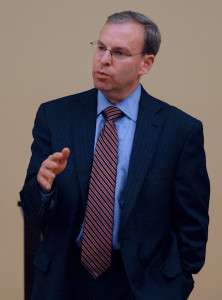Jeremy Ben-Ami, founder and president of advocacy group J Street, advocated for a two-state solution to the Israeli-Palestinian conflict and open discussion on Israel within the American Jewish community in a talk Wednesday at the Black Community Services Center.
Ben-Ami discussed three areas of challenge facing Americans on subjects related to Israel — the future of the Israeli state, Israel in U.S. politics and how the American Jewish community can hold conversation on both subjects. He criticized Israel’s current path as “simply not sustainable.”
“I start by acknowledging all that Israel has accomplished, but we have to be honest and acknowledge all of the challenges and the threats,” Ben-Ami said.

He went on to detail the external and internal threats facing Israel, including “a terrible neighborhood” and the “extreme fringes of Israeli society.”
These challenges, Ben-Ami posited, complicate the question of supporting Israel today.
“Back when I was growing up in the ‘60s and ‘70s, supporting Israel was a really straightforward proposition: You simply stood with Israel,” he said. “Israel was David, a small country, facing down Goliath…Today the story is far less simple.”
“The question of what it means to be pro-Israel is far more complex and the heart of the challenge today is the need to find a resolution to the longstanding conflict with the Palestinian people,” he added.
Being pro-Israel today, as Ben-Ami argued and J Street advocates, means embracing a two-state solution to the Israel-Palestinian conflict, whereby a territorial compromise is the “only way that Israel can remain both a true democracy and retain its Jewish character.”
“For those who care deeply about the future and security of a national homeland for the Jewish people in the land of Israel…the issue of a Palestinian state and the establishment of an accepted border between Israel and that state is an existential necessity,” Ben-Ami said.
While acknowledging that Israel’s own citizens are ultimately responsible to make the choice to change the country’s course, he assigned a role to American Jews, as well.
“We [friends of Israel] have to help our cousins in Israel to recognize the need to change course before it’s too late,” Ben-Ami said.
Moving to the subject of Israel within American politics, Ben-Ami held that the United States must act as mediator between Israel and the Palestinians, comparing the relationship between the latter two parties to a “bad marriage” and arguing against direct negotiations.
“This conflict is like a bad marriage, in which a couple needs a divorce and they need to come to terms on how to separate,” he said. “In my experience, you don’t lock an angry husband and angry wife into a room by themselves and ask them to divide up their assets…You need a mediator.”
“That’s the role that the U.S. and the international community, perhaps through the Quartet or some new entity need to play,” he said, adding that the conflict is an “American national security interest.”
Ben-Ami outlined the parameters for a solution that will form “the framework for a deal if there ever will be a deal.” These included the establishment of two states based on pre-1967 lines with land swaps, a capital for both states in Jerusalem with an internationalized Holy Basin, a demilitarized Palestinian state with an international presence on the borders and compensation rather than right of return for Palestinian refugees.
“Pro-Israel advocacy in this country needs to support and promote strong presidential actions now, to put these ideas forward and to press both parties to reach an agreement before it’s too late,” he said.
Ben-Ami then touched on the “rules that govern the conversation about Israel within the American Jewish community,” particularly in regards to toeing the line between criticism of Israeli government policies and the “de-legitimization” of the state of Israel itself.
“I would argue that it isn’t criticism of Israeli policy that threatens the health of the state of Israel,” Ben-Ami said. “It is the policies of Israel’s present government that threaten its future.”
To this end, he called for open and respectful discussion within the American Jewish community.
“To the extent that any of the doors of the Jewish community are barred…to those who question conventional wisdom on Israel, I think that those who are doing the barring within the American Jewish establishment are putting the future of this community at risk,” he said.
Audience member Serena Eisenberg, Hillel executive director, inquired about the boundaries of the conversation J Street hopes to engender.
“I don’t like the phrase ‘one state solution’…I refer to it as [a] ‘one state nightmare,’” Ben Ami said.
Other audience members posed questions on the polarization of the American Jewish community and the right of Americans to comment on Israeli domestic politics.
The event kicked off the new Stanford chapter of J Street U, a national student-driven network of activists providing an alternative approach to Israel advocacy.